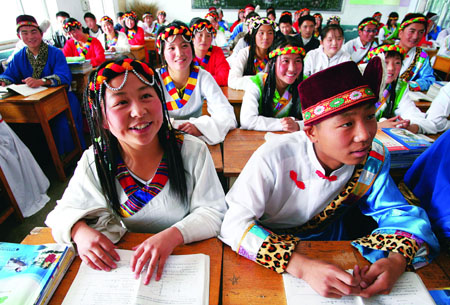| Speeding up social and economic development of the ethnic minority regions and guaranteeing the people of ethnic minorities enjoy equal right to subsistence and development constitute a key to the implementation of the regional national autonomy policy.
Working in accordance with its actual situation, the Tibet Autonomous Region, over the past four decades, has fully exercised the autonomous rights granted by the law in regard to economic and social development. It has worked out and implemented its own Five-Year Plan, setting targets for rapid economic and social development and making great efforts to improve the basic infrastructure, better people's life and arranging economic and social development projects independently. This guarantees that Tibet will always enjoy fast and healthy social and economic development in accordance with its actual conditions.

Tibetan children studying in a vocational school in Jinan of Shandong Province. Many schools in China's hinterland recruit students from Tibet.
Economic and social development of the Tibet Autonomous Region has always enjoyed the great support from the Central Government and aid from areas throughout the nation. Since the early 1950s, the State had been giving special support to Tibetan economic development. It has allocated large amounts of financial subsidies, subsidized special projects and invested in key construction projects. It has also sent a large amount of material aid to Tibet. In the 1980s, the Central Government decided to pursue policies for Tibet and abolished the agricultural tax. Since 1984, the policies of "long-term household land use and independent management" and "long-term private ownership of livestock and independent management" have been adopted in the agricultural and pastoral areas of Tibet.
In June 2001, the Central Government decided to implement the special preferential financial policies featuring "total retention of harvests, progressive increase in subsidies, and special allocation for special aid projects" in Tibet, and at the same time introduced 50 preferential policies and defined 117 aid-Tibet projects.
From 1984 to 2001, the CPC Central Committee and the State Council held four National Conferences on Work in Tibet. Economic development in the region was the topic for discussion, and decisions good for the development of Tibetan economy and enhancement of the standard of living of the Tibetans were made at each conference. The region exercises full autonomy in seeking socio-economic development in accordance with the law. In the light of the local conditions, Tibet worked out 10 Five-Year Plans for Economic and Social Development, which all take fast socio-economic development as the major goal, and have the improved infrastructure and enhanced standard of living of the people as the focal point of work. It makes independent arrangement of its economic and social development programs to ensure the fast and healthy progress of the modernization drive in the region.
Calculated according to comparable prices, from 1978 to 2006, the output value of Tibet rose from 665 million Yuan to 29.005 billion Yuan, its grain production from 513,400 tons to 92,3700 tons, the amount of electricity generated from 134 million kwh to 1.515 billion kwh, social investment in fixed assets from 185 million Yuan to 23.235 billion Yuan, and the annual income of farmers and herders from 178 yuan per capita to 2,435 Yuan per capita.
According to statistics, during the period of time from 2001 to 2005, the accumulated financial subsidies that the Central Government granted to Tibet, with the national debt and special funds for capital construction excluded, amounted to 47.5 billion Yuan, accounting for 92 percent or more of Tibet's total financial expense. These subsidies effectively ensured the needs of Tibetan economic and social leap-forward development for capital.
Since the special aid-Tibet work started in 1995, great progress has been made. By the end of 2006, there are 18 provinces and cities, about 60 national ministries and 17 key State firms attending the aid-Tibet work. Four groups of more than 2,890 aid-Tibet cadres were sent by the Central Government to work in Tibet with 3,170 aid projects. Tibet has received a total amount of 6.2 billion Yuan, Thus, unprecedented changes occurred in the visage of Tibet as a whole.
From June to July 2007, the substitution of the fourth group of aid-Tibet cadres for the fifth will be conducted nationwide.
At present, Tibet is enjoying the best stage in economic and social development. Although the life of the people of various ethnic groups in Tibet has been improved greatly, due to special geographical environment and history Tibet still belongs to one of China's less developed areas. To better implement the leap-forward development strategy and expedite the process of building the well-off society in an all-round way in Tibet still needs more support and aid from the Central Government. In this regard, the Central Government made decision in November 2006 to continue to carry out the preferential policies and support measures during the period from 2006-2010. In the meanwhile, according to the needs of Tibetan development, the Central Government will increase the support in terms of agriculture, countryside, farmers, infrastructure, human resources, education, science, health, culture and social security to promote the rapid development of economy and society in Tibet Autonomous Region. |





